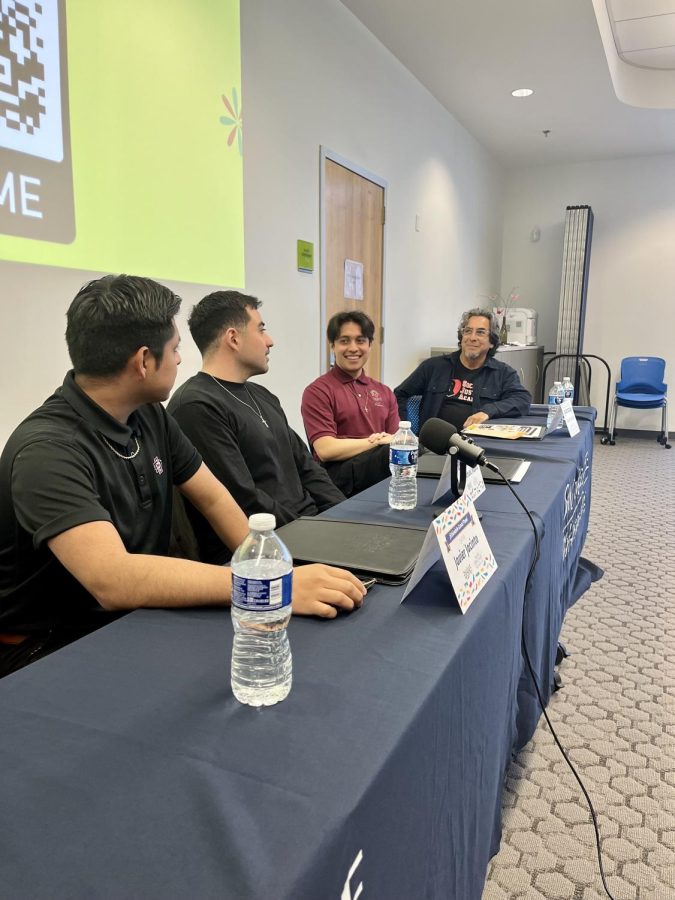San Diego Mesa College held a panel of current and aspiring Latinx male scholars who shared their testimonies and journeys in education, on April 20th.
Hosted by the DEBER program, a panel of four speakers enlightened the AVANZA center through personal testimonies and offered insight into what Latinx males provide for the future of education.
The speakers–Profe. Ted Hernandez, Javier Deigo Jacinto, Emanuel Rubio, and Alvaro Mario Escamilla–were asked questions from DEBER peer mentors Denisse Rodriguez and Georgina Rmaierz. These questions gave insight and amplification to the positive effects that Latinx men bring to education and create opportunities for their stories to shine.
The first speaker, Javier Diego Jacinto, is a higher education leader, father, husband, and proud undocumented/DACA beneficiary. He is currently enrolled at San Diego State University Master of Art in Postsecondary Educational Leadership & Student Affairs.
Similar to those on the panel, Javier shared that he was surrounded by a discouraging environment at a young age. He explained how his own teachers said that college may not be an option for him, and struggled for acceptance due to his background.
“I think I do carry this struggle of having to portray myself in a way where people can see me deemed of being in their spaces,” said Jacinto.
One event that Javier felt changed his perspective on education was his younger brother. After seeing the efforts school teachers put forth to fund his brother’s chemotherapy, Javier realized the impact the teachers could have outside of the classroom.
Jacinto said, “They all gathered to fundraise and be able to pay for the chemotherapy, they really took my family as a part of their own.”
The second member of the panel, Alvaro Mario Escamilla, is a DEBER peer mentor at Southwestern College and a first-generation college student on his way to San Diego State this upcoming fall. During his introduction, Escamilla explained how he too was discouraged throughout a large part of his education, so when Georgina Ramirez prompted the board for any advice they could give to those struggling in education with minimal support–Alvaro was one of the first to chime in.
He advocated the idea of being your number-one fan and finding the drive to push through the levels of education for others and those you love within your own community.
“I believe in…truly believing in yourself and finding the motivation to say, ‘I want to do this for the sake of myself and people I love in my community’,” said Escamilla.
Another member of the board, Emanuel Rubio, is currently an Outreach Assistant in the DEBER program set to graduate from CSU Chico this year, with plans to pursue a master’s in occupational therapy at St. Augustine in San Marcos.
When asked by the facilitators about the ways in which he has defined his identity, Emanuel noted how his career choices helped guide him to find himself.
Rubio said, “One of the jobs that I had after high school was working in the school district as a special ed teaching assistant–that’s where I got one of my passion for working with kids with special needs.”
He noted that in combination with his resiliency, this passion led him to strive to be an occupational therapist and future educator.
The final member of the panel, Profe. Ted Hernandez, is an English professor at Hoover High School, finishing his 21st year, and the director of the Social Justice Academy at Hoover.
When Denisse Rodriguez asked the board what they believed some of the challenges Latinx men face in education, Profe. Hernandez spoke on those he encountered throughout his journey.
“Underrepresentation…in my department, I am the only Hispanic…your kind of alone and you have to fight through that to be who you are and comfortable with who you are to allow your culture and upbringing to go with you into the classroom,” Hernandez said.
He would go on to add a story that encapsulated the struggle that Latinx males face in education given stigmas and stereotypes.
“One of my colleagues at the start of the school year, as we are all there getting ready, was dressed down wearing shorts. As he was walking through the hallway one of the new teachers, who was white, asked him if he could empty her trash,” said Profe. Hernandez.
The panel acknowledged the challenges Latinx male educators face during their journeys, ranging from stereotypes to lack of support, yet highlighted the importance of constantly “echandole ganas” and trailblazing a path for future educators to fearlessly conquer their aspirations in education.




